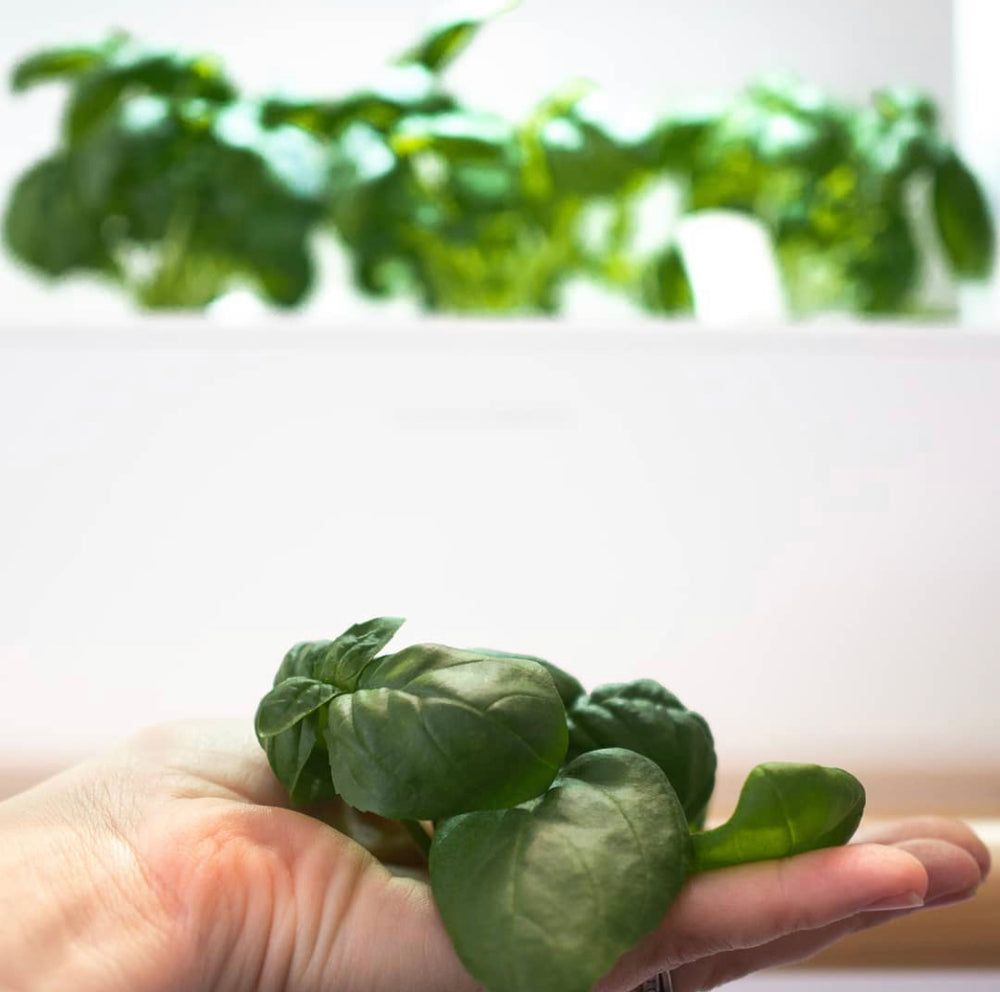News
The No-Nonsense Guide to Harvesting Basil

Have you ever wondered what to do with your basil? Maybe you’re growing basil to make your own pesto or you're giving it away as a gift. Before you can do any of that, you need to harvest it.
When it comes to pruning fresh basil, there are a few key things to remember. These are our tips for helping you successfully harvest basil in your indoor herb garden.
When Should You Start Harvesting?
One of the best things about using an indoor garden is you don’t have to wait for the growing season. You can grow and harvest your plants indoors, any time of year.
Start trimming your basil plant 35 days after planting. To enjoy your plant for longer, gradually harvest the leaves until the plant reaches its maximum age (5-12 weeks).
How Should You Harvest?
It depends on your needs. If you want to use basil leaves for garnish, just pick a few leaves occasionally. If you want to get the most out of your basil pods, make sure you also prune the same stem back once in a while so it can produce new shoots.
If you just remove the leaves without cutting the stem, the plant will age too early. If you’re looking for a bushier growth, pinch off the whole tip during the early stage of growth. The stem will start to grow two new shoots within a week.
When trimming your basil, remember:
Always leave 2 pairs of true leaves on each stem
Before you cut the stem, find the 2 pairs of lowest leaves and make the cut just above them. This encourages the plant to keep thriving.
Always leave at least one-third of the stem to grow
Don’t cut back more than one-third of the stem otherwise you limit its chances to regrow.
Check out our YouTube tutorial for a visual guide:
What Happens if You Don’t Harvest?
Basil likes to be trimmed and we certainly recommend harvesting it. If you don’t pick basil leaves or harvest your basil within 12 weeks, it will produce flower buds. When basil starts to flower, its taste becomes bitter. By pruning your basil plant, you’re delaying its flowering and encouraging new growth.
How Long Will Your Basil Plant Last?
Basil is an annual plant and, unfortunately, won’t last forever. Around 70 days after planting, it may look visibly aged, depending on how often you pruned it. At that point, it’s time to think about replacing the plant.
What Can You Do With Leftover Basil?
Basil is perfect for drying and storing for later use. You don’t need any specialized equipment for drying basil. Air drying is one of the most popular options. Check out our guide on how to preserve basil and other herbs here.
You can also freeze your leftover basil. With frozen basil, a lot of the plant’s vitamins and minerals remain viable. You can place a set of leaves on a baking sheet lined with foil and pop it in the freezer.
Another option is placing chopped herbs in an ice cube tray with some water. You can also store basil in a glass jar.
Leftover basil is also great for sprinkling over a caprese salad with some olive oil. Click & Grow Basil is a sweet basil. Feel free to experiment with other varieties from our collection such as Cinnamon Basil and Lemon Basil.

Image: @theathertonhouse
Click & Grow Basil Nutrition
Click & Grow basil has 2.7 times more antioxidant activity than non-homegrown basil. Your body uses antioxidants to neutralize free radicals. Antioxidants also promote a healthy immune system. More antioxidants means more flavor.
Click & Grow Basil has 37 times less nitrate residuals than basil grown in hydroponics. That makes Click & Grow Basil safe to use even in high quantities. Nitrates are natural chemicals found in food. Foods that are high in nitrates, however, can cause health complications.
Bonus Tips
Your smart garden only needs one lamp arm for basil plants to grow. If you notice the stems are about to touch the lamp, simply cut them back - they will regrow.
If you see some basil leaves turning yellow, it may be due to a nutrient deficiency. At this point, it’s likely that the plant pod has reached the end of its harvesting time and become rootbound. Check the general information of each plant pod to find its ideal harvesting time.
Have fun growing and harvesting basil in your Click & Grow smart garden!
Browse our fully-automated indoor gardens
